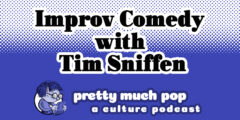
What role does improv comedy play in popular culture? It shows up in the work of certain film directors (like Christopher Guest, Adam McKay, and Robert Altman) and has surfaced in some of the TV work of Larry David, Robin Williams, et al. But only in the rare case of a show like Whose Line Is It Anyway? is the presence of improvisation obvious. So is this art form doomed to live on the fringes of entertainment? Is it maybe of more apparent benefit to its practitioners than to audiences?
Mark, Erica, and Brian are joined by Tim Sniffen, announcer on the popular Hello From the Magic Tavern podcast, and a member of the Improvised Shakespeare Company and Baby Wants Candy (improvised musicals). He’s also written for Live From Here and other things. We discuss different types of improv, a bit of the history and structure of Second City, improv’s alleged self-help benefits, how improvisation relates to regular acting, writing, podcasting, and other arts, and more.
Here are a few improv productions to check out:
- ASSSCAT, a recurring show by the Upright Citizens Brigade (Amy Poehler’s start)
- This Improvised Shakespeare Company performance includes Thomas Middleditch of Silicon Valley
- Paul Provenza’s Set List (this one features Robin Williams)
- Baby Wants Candy including Tim performing a satire of Mary Poppins
- Off Book, The Improvised Musical podcast
- More improv TV shows (Drew Carey seems to be involved with half of these.), and even more on this Reddit thread
- “Top 20 Improvised Movie Moments” from WatchMojo.com
- The long-running (and just now ending) Improvised Star Trek podcast
- Of the hundreds of Hello from The Magic Tavern episodes, you may want to try #3 as an introduction and then #10 where Tim really gets to shine
- Here are more improv podcasts; Paul F. Tompkins has probably been a guest on all of them. Though really, aren’t nearly all podcasts (and reality TV shows, for that matter) improv? There are several other lists of best improv podcasts you can easily find with a quick web search.
- There are also some podcasts about techniques of improv, for example the Improv Resource Center Podcast with Kevin Mullaney
- And don’t forget role-playing games and their associated podcasts and YouTube streams; those are definitely improv of some sort, and occasionally done by professional actors or comedians, as in Critical Role and HarmonQuest.
For further reading, check out:
- Something Wonderful Right Away by Jeffrey Sweet (2004)
- “What Exactly Is Improv in the Filmmaking Process?” by Lauren McGrail
- “The Philosophy Behind The Inspired Silliness Of ‘Anchorman,’ 10 Years Later” by Lauren Duca
- “Philadelphia Theatre Company hosts ‘Improv Is the Future of Theater’ panel discussion: Improvising an improv economy” by Judy Weightman
- “Applying Improv Techniques to Threat Intelligence” by David Peduto
For musical improv, try Nakedly Examined Music #30 with Paul Wertico and David Cain, and also #55 with Don Preston (Zappa’s keyboardist) whom Mark quoted in this discussion.
This episode includes bonus discussion that you can only hear by supporting the podcast at patreon.com/prettymuchpop. This podcast is part of the Partially Examined Life podcast network.
Pretty Much Pop: A Culture Podcast is the first podcast curated by Open Culture. Browse all Pretty Much Pop posts or start with the first episode.
Improv Comedy (Live and Otherwise) Examined on Pretty Much Pop: A Culture Podcast #20 is a post from: Open Culture. Follow us on Facebook, Twitter, and Google Plus, or get our Daily Email. And don't miss our big collections of Free Online Courses, Free Online Movies, Free eBooks, Free Audio Books, Free Foreign Language Lessons, and MOOCs.
from Open Culture https://ift.tt/2OyhF0W
via Ilumina
Comments
Post a Comment